As the COVID-19 pandemic spreads to areas already struggling with war, climate change, economic collapse and displacement, it will disproportionately impact the world’s most vulnerable populations, including refugees, asylum-seekers, and internally displaced people (IDPs), humanitarian groups warn.
The impact of the pandemic both exacerbates and is exacerbated by the conditions in which the world’s 70 million displaced people already live, warns a report by humanitarian group Refugees International.
A series of factors make them extremely vulnerable to the spread of the virus, says Canadian humanitarian worker Alexandre Lamarche, one of the co-authors of the report.
The guidelines issued by the World Health Organization and public health agencies all across the developed world are simply not applicable to those living in refugee or IDP camps, or sharing a roof or even a tent with several families, Lamarche said in a phone interview from Washington D.C.
“You can’t tell people to socially distance in an overcrowded camp,” Lamarche said. “You can’t tell people to wash their hands when they don’t have soap or even water to do so.”
The ease with which the coronavirus spreads makes these living situations particularly dangerous, Lamarche said.
Difficulty accessing health services
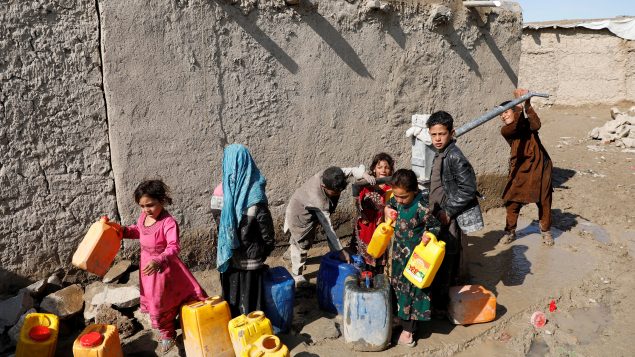
Internally displaced Afghans collect water from a public water pump next to their tents at a refugee camp, during the spread of coronavirus disease (COVID-19), in Kabul, Afghanistan March 28, 2020. (Mohammad Ismail/REUTERS)
The report also notes that the forcibly displaced generally have difficulty accessing basic services, especially healthcare.
When they do get access, it tends to be to primary healthcare, Lamarche said. Intensive care facilities, the kind of care that COVID-19 patients need when they develop acute respiratory distress syndrome, are scarce or nonexistent, especially in camp settings, the report notes.
There are fewer than 1,700 ventilators and beds in war-torn Yemen, northern Syria and Gaza, a report by Save the Children said on Tuesday.
Dr. Tanjina Mirza, who co-leads Plan International Canada, a humanitarian NGO, told Radio Canada International in a recent interview she shudders to think what would happen in overcrowded Rohingya refugee camps in Cox’s Bazar in her native Bangladesh, if the disease takes root there.
Cramped conditions and poor sanitation
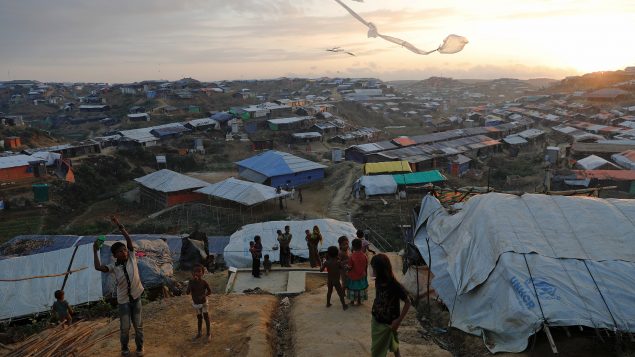
Rohingya refugee children fly improvised kites at the Kutupalong camp near Cox’s Bazar, Bangladesh on Dec. 10, 2017. (Damir Sagolj/REUTERS)
There are nearly 900,000 refugees living in the camps in Cox’s Bazar and more than 400,000 Bangladeshis living in close proximity to them.
Cramped living conditions, poor water quality and lack of proper sanitation in the camps leave refugees vulnerable to a variety of communicable diseases, Dr. Mirza said.
A recent humanitarian risk assessment of the Rohingya response warned, “the potential mortality and morbidity risk associated with COVID-19 is likely to surpass global averages,” according to the Refugees International report.
The pandemic could force hundreds of thousands of displaced people in sub-Saharan to seek medical help in bigger urban centres, making the situation even more dire, Lamarche said.
NGOs worried about their ability to deliver life-saving services
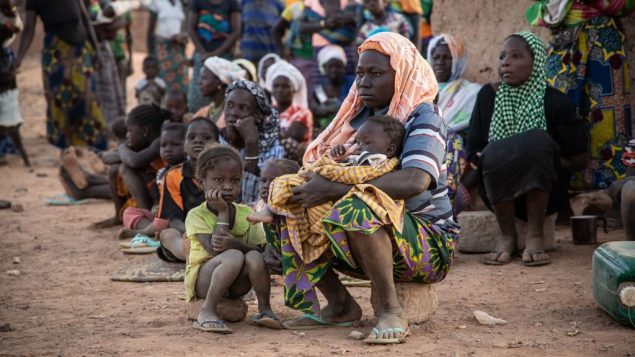
Women and children sit outside a house in a district that welcomes Internally Displaced People (IDP) from northern Burkina Faso in Kaya, on Feb. 2, 2020. (Olympia De Maismont/AFP via Getty Images)
Lamarche said she and her colleagues in various aid and humanitarian agencies are also worried about how the pandemic will affect their ability to deliver services to vulnerable populations across Africa, the Middle East, Asia and Latin America.
Curbs on international and local travel are also preventing the delivery of much-needed humanitarian staff and cargo to respond to ongoing crises in these countries, the report notes.
The potential resulting shortages of goods and technical capacity could have devastating consequences in many humanitarian crises across Africa, where there are more than 17.7 million IDPs and over 6.3 million refugees, the report says.
More than five million people are facing severe food insecurity across the Central Sahel region of Africa, according to a new joint food security assessment released by the World Food Programme on Thursday.
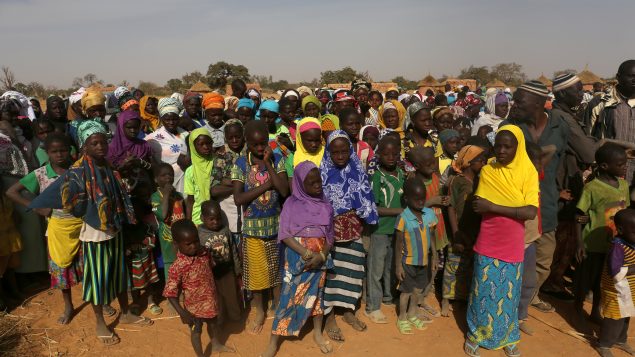
Displaced people wait for help at a village in Dablo area, Burkina Faso March 1, 2019. (Luc Gnago/REUTERS)
Burkina Faso – which has seen the largest number of officially-reported deaths from COVID-19 anywhere in sub-Saharan Africa – is where the number of food insecure is expected to more than triple to 2.1 million people as the lean season sets-in from June to August, said David Bullman, a Canadian who is the WFP representative in the country.
Speaking to Radio Canada International from Ouagadougou, Bullman said while the majority of over 300 COVID-19 cases are concentrated in the capital, humanitarian agencies worry about the virus eventually making its way to the north and the east of Burkina Faso where 800,000 IDPs have taken refuge from the ongoing conflict.
The most vulnerable parts of the Burkinabe population don’t have access to fridges or the financial resources to stock up on food, he said.
“Those are the people that we are particularly concerned about,” Bullman said, “that they are going to be in a lot of difficulty as this goes forward.”
Peacekeeping operations affected by COVID-19
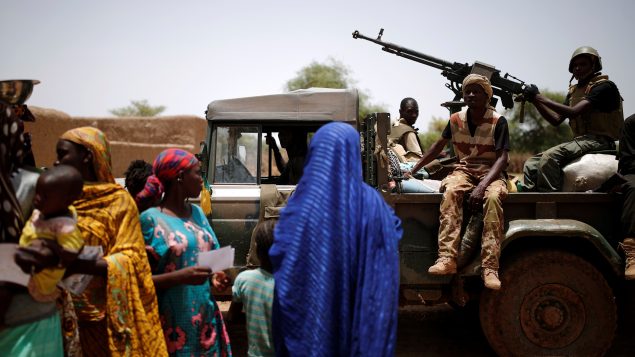
Malian Armed Forces (FAMa) soldiers drive along women and children during the Operation Barkhane in Ndaki, Mali, July 29, 2019. (Benoit Tessier/REUTERS)
The outbreak of COVID-19 could also undermine critical peacekeeping efforts in sub-Saharan Africa, the report by Refugees International warns.
Many countries that contribute troops to the United Nations peacekeeping missions are experiencing outbreaks of the novel coronavirus, the report says. In order to curb the spread of the disease, the UN recently has requested that nine troop-contributing countries delay the regular rotation of their soldiers in and out of peacekeeping missions.
The pause in rotations could lead to fatigue and morale issues, as well as continued gaps in critical mission capability, the report says.
‘Cautiously optimistic’
“If we want to give anyone a fighting chance, we’re going to have to mobilize some funds and now is the time,” Lamarche said.
But Lamarche said her biggest fear is that the international community will not mobilize to face the pandemic.
“Everyone is grappling with this within their own borders and people are not paying attention to more vulnerable populations,” Lamarche said.
Still, Lamarche said she is “cautiously optimistic” that the international community will rise to the challenge.
“I think that inherently people are good and I hope that that goodness will drive them to action,” Lamarche said. “Whether it’d be people digging into their own pockets at a difficult time and making a small donation to help organizations worldwide that are working on this, or if it’s donor governments deciding to increase their humanitarian funding.”
Yet humanitarian agencies also have to plan for the worst-case scenario of major donors such as the U.S. or the EU drastically cutting their foreign aid funding, she added.







For reasons beyond our control, and for an undetermined period of time, our comment section is now closed. However, our social networks remain open to your contributions.